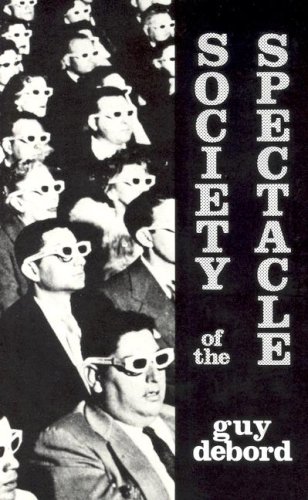Guy Debord: Society of the Spectacle (1967–) [FR, EN, NL, GR, DE, IT, ES, TR, BR-PT, RO, SR, HU, LT, PL, CZ]
Filed under pamphlet | Tags: · activism, capitalism, consumerism, everyday, life, mass media, situationists, spectacle, spectatorship

“The Das Kapital of the 20th century. An essential text, and the main theoretical work of the situationists. Few works of political and cultural theory have been as enduringly provocative. From its publication amid the social upheavals of the 1960’s up to the present, the volatile theses of this book have decisively transformed debates on the shape of modernity, capitalism, and everyday life in the late 20th century.
Self-proclaimed leader of the Situationist International, Guy Debord was certainly responsible for the longevity and high profile of Situationist ideas, although the equation of the SI with Guy Debord would be misleading. Brilliant but autocratic, Debord helped both unify situationist praxis and destroy its expansion into areas not explicitly in line with his own ideas. His text The Society of the Spectacle remains today one of the great theoretical works on modern-day capital, cultural imperialism, and the role of mediation in social relationships.”
Publisher Buchet-Chastel, Paris, Nov 1967
175 pages
Wikipedia (EN)
La Société du Spectacle (French, 1967; HTML)
Society of the Spectacle (English, trans. Fredy Perlman and Jon Supak, 1970; HTML)
De spektakelmaatschappij (Dutch, trans. Jaap Kloosterman and René van de Kraats, 1976/2001, updated on 2019-11-8)
Η Κοινωνία του Θεάματος (Greek, trans. Panos Tsachageas and Nikos B. Alexiou, 1977, updated on 2019-11-8)
Die Gesellschaft des Spektakels (German, trans. Jean-Jacques Raspaud, 1978)
La societa dello spettacolo (Italian, trans. Paolo Salvadori, 1979)
Society of the Spectacle (English, trans. Donald Nicholson-Smith, 1994; HTML)
La sociedad del espectacul (Spanish, trans. Rodrigo Vicuña Navarro, 1995)
Gösteri toplumu ve yorumlar (Turkish, trans. Ayşen Ekmekçi and Okşan Taşkent, 1996, added on 2012-12-27)
A sociedade do espetaculo (BR-Portuguese, trans. Estela dos Santos Abreu, 1997)
Societatea spectacolului. Comentarii la societatea spectacolului (Romanian, trans. Ciprian Mihali and Radu Stoenescu, 1998)
La sociedad del espectacul (Spanish, trans. José Luis Pardo, 1999)
Η Κοινωνία του Θεάματος (Greek, trans. Sylvia, 2000, added on 2019-11-8)
Society of the Spectacle (English, trans. Ken Knabb, 2005; new ed., annotated, 2014, HTML, PDF, EPUB, added on 2019-11-12)
Društvo spektakla (Serbian, trans. Aleksa Golijanin, 2003/2012; HTML, added on 2017-7-27)
Spektákulum társadalma (Hungarian, trans. Miklós Erhardt, 2006, updated on 2019-11-8)
Spektaklio visuomenė (Lithuanian, 2006, added on 2019-11-8)
Społeczeństwo spektaklu oraz Rozważania o społeczeństwie spektaklu (Polish, trans. Mateusz Kwaterko, 2006, updated on 2019-11-8)
Společnost spektáklu (Czech, 2007, updated on 2019-7-21)
La sociedad del espectacul (Spanish, trans. Colectivo Maldeojo, 2009)
Societatea spectacolului (Romanian, trans. Cristina Săvoiu, 2011, added on 2015-11-29)
Michele White: The Body and the Screen: Theories of Internet Spectatorship (2006)
Filed under book | Tags: · body, interface, internet, photography, screen, spectatorship

Internet and computer users are often represented onscreen as active and empowered—as in AOL’s striding yellow figure and the interface hand that appears to manipulate software and hypertext links. In The Body and the Screen Michele White suggests that users can more properly be understood as spectators rendered and regulated by technologies and representations, for whom looking and the mediation of the screen are significant aspects of engagement. Drawing on apparatus and feminist psychoanalytic film theories, art history, gender studies, queer theory, critical race and postcolonial studies, and other theories of cultural production, White conceptualizes Internet and computer spectatorship and provides theoretical models that can be employed in other analyses. She offers case studies and close visual and textual analysis of the construction of spectatorship in different settings.
White shows that despite the onscreen promise of empowerment and coherence (through depictions of materiality that structure the experience), fragmentation and confusion are constant aspects of Internet spectatorship. She analyzes spectatorship in multi-user object-oriented settings (MOOs) by examining the textual process of looking and gazing, contrasts the experiences of the women’s webcam spectator and operator, describes intentional technological failures in net art, and considers ways in which traditional conceptions of artistry, authorship, and production techniques persist in Internet and computer settings (as seen in the creation of virtual environment avatars and in digital imaging art). Finally, she analyzes the physical and psychic pain described by male programmers in Internet forums as another counternarrative to the common tale of the empowered user. Spectatorship, White argues, not only affects the way specific interfaces are understood but also helps shape larger conceptions of self and society.
Published by MIT Press, 2006
ISBN 0262232499, 9780262232494
307 pages
PDF (updated on 2012-9-3)
Comment (0)
